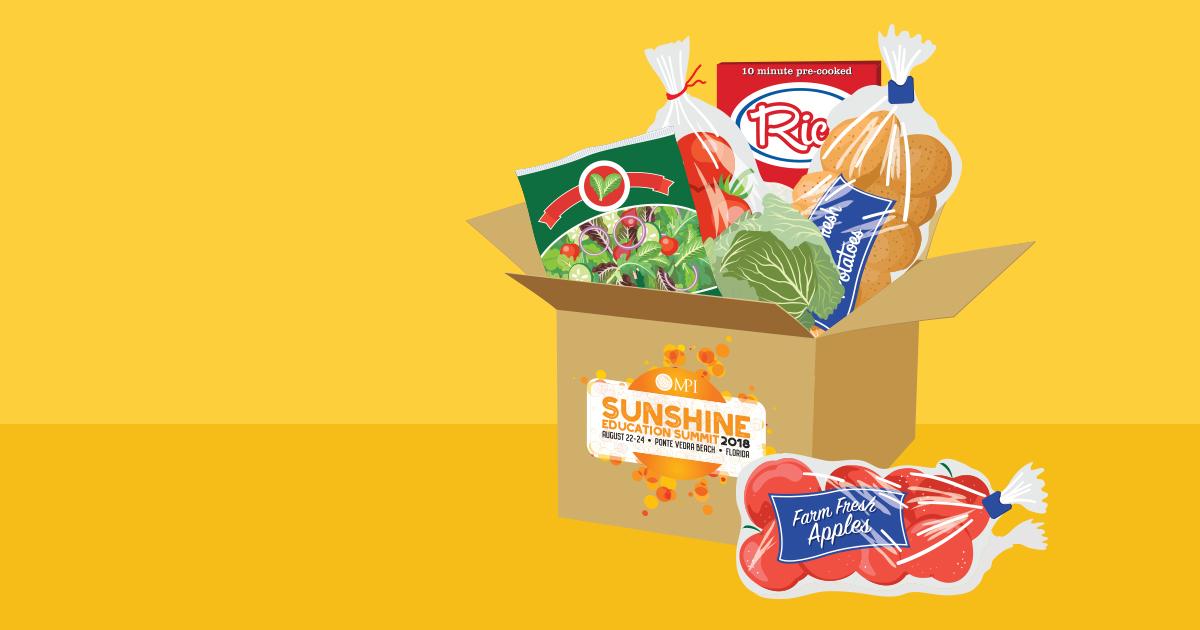Sustainable business operations and corporate social responsibility (CSR) are closely related, well-established forces in business today.
Increasingly, meeting and event planners and their vendor partners are asking how they can make their events more sustainable and give back to the local communities in which they meet. With the power of partnership and a little planning, food rescue can make a huge impact in both areas.
The Food Rescue Committee of the Sustainable Events Network, Florida & Caribbean (SENFC) successfully partnered with the MPI Sunshine Education Summit (SES) and the Sawgrass Marriott Resort in executing food rescues at all food-related events throughout the conference, Aug. 22-24 in Ponte Vedra Beach, Fla. With the assistance of student interns from C2C: Connections to Careers, all leftover prepared food from each event was properly chilled, packed up and transported to three local recipient charities. Dining with Dignity of St. Augustine, BEAM of Jacksonville Beach and the University of North Florida’s Food Fighters (a student-led group) successfully “rescued” 82 trays of valuable nutrition and re-distributed it to homeless and food-insecure members of those communities.
According to Feeding America, Duval County (Jacksonville area) is one of Florida’s most food-insecure counties, where an estimated 170,900 residents (19 percent of the population) are not always sure of their ability to obtain enough food for themselves and their households. It is not unusual for great meeting venues such as the Sawgrass Marriott to be located in or near areas of high food insecurity, thus finding themselves in position to help their communities by cooperating with local agencies that can collect and distribute valuable leftover nutrition.
The food rescue concept has the further advantage of helping catering venues reduce food waste. By diverting the extra meals to the food-insecure, they are keeping much of this food from ending up in local landfills, where it generates harmful methane gas. The U.S. Environmental Protection Agency reports that about 94 percent of the food we throw away ends up in landfills or is burned into the atmosphere. The event industry, as a driver of large-volume food production within the hospitality industry, is uniquely positioned to make a difference in reducing those numbers.
In order to introduce the concept of food rescue to the 350-plus conference attendees, the SES opening general session featured an overview of the planned rescues. A short video produced by the Food Rescue Committee chronicling their first food rescue at the 2016 NACE Annual Conference (held at the Diplomat Resort in Hollywood, Fla.) illustrated the impact of food rescue on a local community. Inspiring event professionals and their vendor partners to identify which events will likely yield leftovers is one of the key focuses of the committee.
Planning a food rescue is a contingency plan; in a perfect event-planning scenario there will be no food left over. More than 20 conference delegates attended a breakout session on food rescue during the SES in order to delve further into this area of contingency planning. Participants discussed the key components of the committee’s Food Rescue Plan and had the opportunity to learn from leaders of the recipient charities about the impact that leftover food can have on both their clients and the charity’s bottom line. Additionally, a member of the hotel’s culinary team weighed in to address questions and concerns.
You, too, can plan a food rescue for your next event or conference! For questions or a copy of the Food Rescue Plan created by the Food Rescue Committee of the SENFC, inquire at www.SENFC.org.
John D. Buschman, Ph.D., a lecturer and post-doctoral associate at the Chaplin School of Hospitality & Tourism Management, Florida International University in North Miami, contributed to this article.

